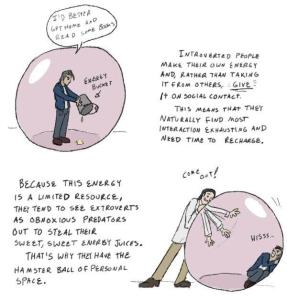Recently, M and I sat down to watch Inside Out together and I live-tweeted it, which was fun.

I was excited to see the film for the first time — the previews looked great and as I mental health advocate, I had high hopes for this film that would be all about getting to know your feelings. As I watched, however, I felt that, as a person who lives with a behavioral disorder, the film doesn’t really do anything positive for the representation of people who have mood disorders, who are introverted, or who are non-nuerotypical in any way. Given the positive reviews this film received from the mental health community when it was first released, I was surprised and disappointed to see that this film actually promotes several negative stigmas, particularly in regard to the character of Sadness.
In the beginning of the film, there exists only Joy — that is the first emotion to come into being inside the main character, Riley’s, newborn mind. Sadness joins shortly thereafter, in a serious reversal that I believe any parent would attest to: what newborn shows an actual capacity for happiness in their first few months, let alone moments, of being? Sorry, Disney, but most babies are just crying, pooping potatoes for the first few months of life, with nary a giggle to be seen.

Immediately following the arrival of Sadness, the two characters are shown to be in direct opposition to each other. While Sadness seems to be largely indifferent to Joy’s presence, Joy is persistently trying to be rid of Sadness. Joy’s constant attempts to undo the presence of Sadness are troublesome. In the beginning of them film, Joy says that she doesn’t know what Sadness does, that it seems that Sadness to serves no obvious purpose (at least, compared to the other emotions), and that Joy has checked and “there’s nowhere for her to go”. That’s a very sophomoric perspective on the role of sadness in the human experience. Sadness is a very important emotional function — just as much as joy, fear, anger, or disgust. However, Joy’s complete rejection of Sadness’ utility is continually played out as she persistently bullies Sadness for simply existing.
The other emotions, Fear, Anger, and Disgust, despite being negative emotions, seem to meet with Joy’s approval because they each serve a clear and present purpose in the life of Riley. The filmmakers and writers obviously tried to increase the utility of Fear, Anger, and Disgust by having each of them appear to be multifaceted in their expression of emotional states of being. While Joy appears to embody only that which is effervescent and positive, the other Emotions are observed to act both as their functionary titles and with correlated emotions. The character of Disgust, for instance, not only represents a biologically programmed aversion to new foodstuffs, but also cattiness, sarcasm, and social acumen.
This approach by the filmmakers allows the audience a fairly intuitive grasp of the purpose of each Emotion. The character designs were carefully planned out to reinforce the correlation of the given emotion to the personified character. Fear is thin, anxious, and prone to surprise. Anger is short, stout, and blocky. Disgust is green, for crying out loud! But then, there is Sadness. Sadness is depicted as dowdy, short, and plump. She wears glasses and she’s extremely soft-spoken. Despite appearing to be well-meaning, Sadness is revealed to be a trouble-maker in the eyes of her cohorts, if an accidental one. In every way imaginable, Sadness’ character was designed to imply that she is undesirable. Additionally, by casting Sadness as the foil to Joy’s character, the writers reinforce a harmful societal value: that sadness, introvertedness, and introspection are wrong and therefore we must all strive to be happy, one-hundred percent of the time.
It’s disingenuous to portray Sadness this way. Many people, myself included, don’t experience happiness in the over-wrought, excited way in which the character of Joy is portrayed. For us, happiness comes from time spent alone, in introspection, gaining energy from our communion with ourselves. In that way, Sadness might be in my driver’s seat — but that doesn’t make me perpetually sad, and it doesn’t make me wrong. It is simply the way I best interact with the world. But instead of making her dynamic as the human experience, Inside Out’s Sadness is written as a witless castaway, unworthy of merit.
Meanwhile, Joy is clearly made out to be Riley’s primary and most desirable emotion — of course, considering the only four other options: Fear, Sadness, Anger, and Disgust — Joy is the only character that doesn’t have a negative connotation to compete with. Of course you want Joy to be in charge! You wouldn’t want any of those other bad emotions to be responsible for your world interactions, would you?
This is heavily reminiscent to me of the way that I am often treated by well-meaning extroverts: Why would you want to stay home and be sad all weekend? Because I’ve had a busy week interacting with people, and I am out of spoons. Why do you listen to that sad music? It only makes you feel worse! No, this music jives with my soul, and it is healing me.
You see, just because I experience the world differently from you, doesn’t mean that I’m wrong. I am just different. Please, allow me to be different without fear of reprisal.

By the end of the film, we begin to see that Emotions can work in tandem to create memories, which is meant by the filmmakers to be a redeeming moment for Sadness and Joy. I felt less resolved, though. The film still hasn’t given Sadness a purpose except as a foil to Joy. This is a harmful dichotomy for a lot of reasons, one of which we actually see play out in the film when Riley’s mother asks her to be happy about the move for her father’s sake. The end result being that Riley internalizes her negative emotions about her family’s move (with help from Joy) until she detaches from her family completely, almost running away from home. It isn’t until Riley is permitted to feel sadness that she is able to synthesize all of the feelings she has and move on from them. That’s an important lesson for us all, but the filmmakers failed to represent it as such. Instead, we are shown that Joy fights Sadness almost to the point of obliterating them both (certainly to the point of obliterating several of Riley’s internal mental structures, memories, and processes), only to finally acquiesce to Sadness’ presence, while still failing to validate Sadness’ reason for being.
In real life (read: in all of our lives) sadness actually serves a very important purpose. Though not highly valued in our current culture, sadness and other “feel-bad” emotions help us to slow down, confront troublesome circumstances, and come to a deeper understanding of ourselves. Sadness improves your memory, heightens your better judgment, increases your motivation to enact positive changes in your life, and can, in some cases, improve your interpersonal communication. Perhaps this is why, in the film, Riley’s mother has Sadness in the driver’s seat — Sadness isn’t just about feeling blue, it’s about feeling, period. Sadness allows us the increased capacity for compassion, discernment, and responsible decision-making that makes life fruitful.
To say that Inside Out was entirely upside-down wouldn’t be fair. It’s a cute movie, it was well-animated, and it is definitely a powerful tool to give children access to the language needed to talk candidly about their feelings. But as a representation of the depth and breadth of the emotional landscape within each of us, it falls short, particularly in the eyes of this gal living with bipolar disorder.
Someday, when she is old enough to have this conversation, I will have to sit my daughter down and explain to her that Mommy’s brain doesn’t work like everyone else’s brain. I may even need to have a conversation with her, in some distant future, about how her brain doesn’t work like everyone else’s brain. This film does not give us an appropriate schema for that conversation. After all, what good does it do to tell someone besieged by sadness to “let Joy takeover”? That would not be helpful, and it would not be fair to disrespect their experience so callously. Instead, we might say, “Sadness in taking the wheel right now, because it’s a road you need to travel.”







